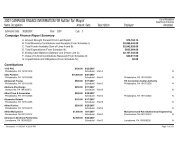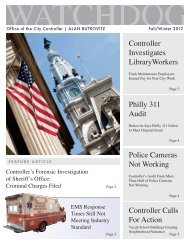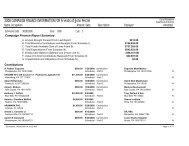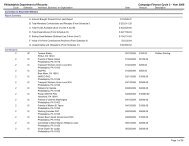department of revenue tax discovery program action steps to
department of revenue tax discovery program action steps to
department of revenue tax discovery program action steps to
Create successful ePaper yourself
Turn your PDF publications into a flip-book with our unique Google optimized e-Paper software.
Appendix IV: Study on the Underground Economy in Philadelphia<br />
Office <strong>of</strong> the Controller<br />
City <strong>of</strong> Philadelphia<br />
Financial and Policy Analysis Unit<br />
The Underground Economy in Philadelphia<br />
Executive Summary<br />
Philadelphia’s construction sec<strong>to</strong>r has experienced a recent boom, pushed upward by a strong<br />
housing market, <strong>tax</strong> abatements on new construction, and national recognition <strong>of</strong> Philadelphia’s<br />
renaissance. With the benefits <strong>of</strong> a burgeoning economy come growing pains; in the case <strong>of</strong><br />
Philadelphia’s construction industry those growing pains come in the form <strong>of</strong> an informal<br />
construction economy that costs the city in a number <strong>of</strong> ways.<br />
Like many other localities throughout North America, Philadelphia has recently come <strong>to</strong> the<br />
realization that much <strong>of</strong> its labor is performed by workers who are either undocumented or are<br />
misclassified by their employers. Forming a significant portion <strong>of</strong> the “informal economy”, these<br />
workers typically do not pay income <strong>tax</strong>es (or they pay less than they should), while their<br />
employers skirt some costs <strong>of</strong> doing business by avoiding payment <strong>of</strong> payroll <strong>tax</strong>es and social<br />
insurance <strong>program</strong>s (such as unemployment insurance, worker’s compensation, health insurance,<br />
etc).<br />
Misclassified construction workers are prevalent throughout the country, representing about 15-<br />
25% <strong>of</strong> the overall construction workers in the places where it has been studied. Due <strong>to</strong> the<br />
nature <strong>of</strong> the work and the structure <strong>of</strong> employment, the construction industry has higher<br />
incidences <strong>of</strong> misclassification than other sec<strong>to</strong>rs <strong>of</strong> the economy. Research in Washing<strong>to</strong>n State<br />
found that construction firms were 1.4 times more likely <strong>to</strong> misclassify workers than firms in any<br />
other industry, while a similar report in New York State found that 15% <strong>of</strong> the construction<br />
workers there are misclassified compared <strong>to</strong> 10% <strong>of</strong> workers in all other sec<strong>to</strong>rs.<br />
The costs <strong>of</strong> worker misclassification come in a number <strong>of</strong> forms. Direct costs <strong>to</strong> governments<br />
come from lost <strong>tax</strong> <strong>revenue</strong> and social insurance premiums. Indirect (and therefore much harder<br />
<strong>to</strong> measure) costs come from increased risk <strong>to</strong> workers, demand for city services, and costs-<strong>of</strong>doing-business<br />
passed on <strong>to</strong> legitimate employers.<br />
A very rough estimate <strong>of</strong> direct costs <strong>to</strong> the City <strong>of</strong> Philadelphia from lost wage <strong>tax</strong>es amounts <strong>to</strong><br />
between $2.1 million and $7.4 million.<br />
Policies that have been suggested in other studies fall under two categories: enforcement and<br />
regulation. On the enforcement side, suggestions include increasing efficiency and efficacy by<br />
joining state and local efforts, as well as by incorporating industry-based policing. Regulation<br />
suggestions include clarifying or changing the legal definitions <strong>of</strong> worker class and requiring a<br />
prevailing wage for all government-sponsored construction.<br />
24
















